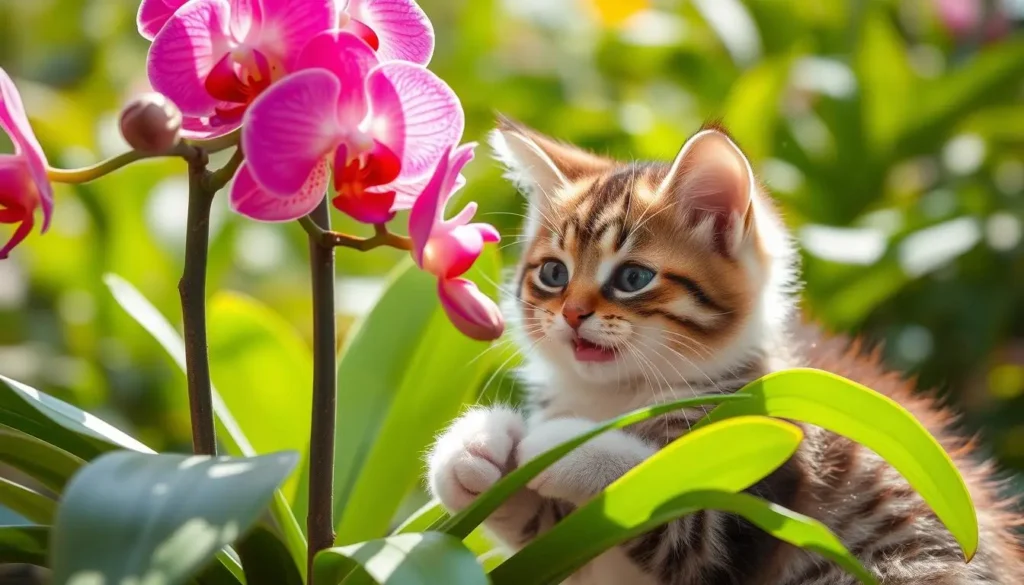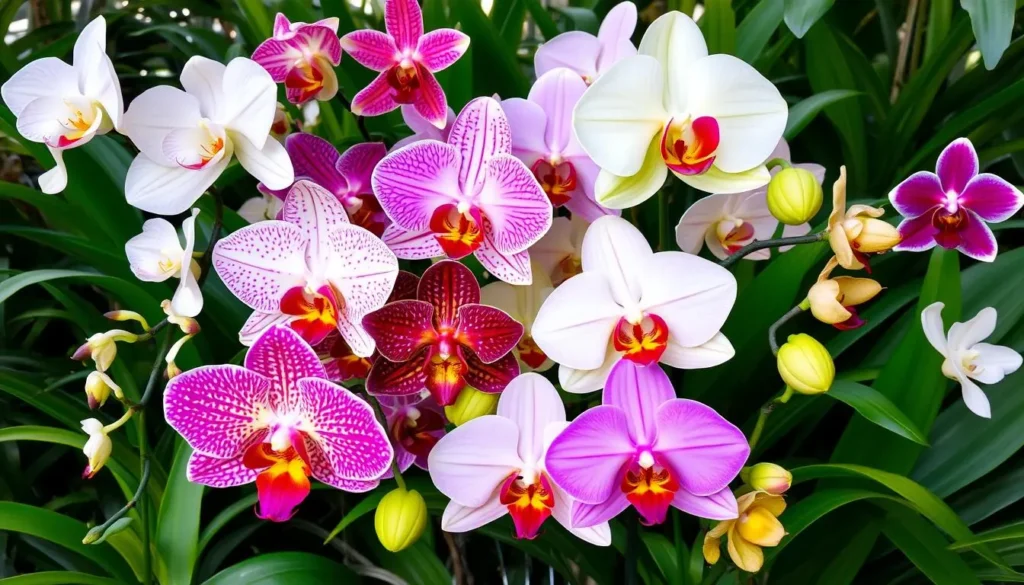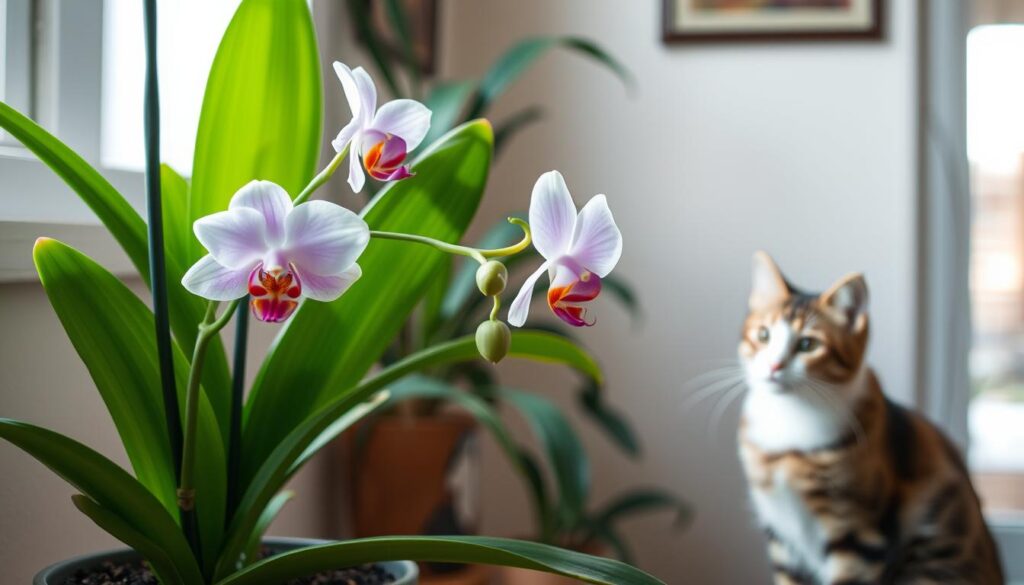Table of Contents
If you own a cat, knowing which plants are safe is key. Orchids are beautiful but can be harmful to cats. This guide will help you understand the risks and keep your cat safe.

Key Takeaways
- Orchids can be toxic to cats if ingested, potentially causing gastrointestinal issues and skin irritation.
- Identifying and avoiding common poisonous orchid varieties is crucial for cat owners.
- Proper placement and pet-proofing techniques can help keep your cats safe around orchids.
- Knowing the symptoms of orchid poisoning and first aid steps can help you respond quickly in an emergency.
- Exploring orchid alternatives and proper orchid care can create a safe, cat-friendly environment in your home.
What Are Orchids?
Orchids are a fascinating family of flowering plants known for their beautiful blooms. They belong to the Orchidaceae family, with over 25,000 species. This makes them one of the largest plant families globally. Orchids range from the delicate Phalaenopsis to the vibrant Dendrobium, offering a wide variety of types, colors, and sizes.
Types of Orchids
The world of orchids is incredibly diverse. There are many varieties that fit different growing conditions and preferences. Some popular types include:
- Phalaenopsis (Moth Orchids): Known for their long-lasting flowers and easy care, Phalaenopsis orchids are loved by indoor gardeners.
- Dendrobium: These orchids have stunning blooms in a variety of colors, from bright reds and yellows to soft pastels.
- Cymbidium: With their elegant, arching flower spikes, Cymbidium orchids are often used in bouquets and floral arrangements.
- Oncidium (Dancing Lady Orchids): Their intricate, dancing-like flowers make Oncidium orchids a captivating addition to any indoor space.
Orchids as Houseplants
Orchids are becoming more popular as indoor houseplants. They are known for their beauty and easy care. With the right conditions, many orchid species can thrive indoors, adding natural beauty to any home. They prefer bright, indirect light, moderate humidity, and well-draining soil, making them a great choice for many homeowners.
| Orchid Variety | Light Requirements | Humidity Needs | Soil Preference |
|---|---|---|---|
| Phalaenopsis | Bright, indirect light | Moderate to high humidity | Well-draining, bark-based potting mix |
| Dendrobium | Bright, indirect light | Moderate humidity | Well-draining, bark-based potting mix |
| Cymbidium | Bright, indirect light | Moderate humidity | Well-draining, bark-based potting mix |
| Oncidium | Bright, indirect light | Moderate to high humidity | Well-draining, bark-based potting mix |

Are Orchids Toxic to Cats?
As cat owners, we always want what’s best for our pets. We need to know if plants in our homes are safe. Orchids are a concern because they might be harmful to cats. Let’s look into orchid toxicity for cats and how it affects feline health concerns.
Orchids are part of the Orchidaceae family, with many different types. While some orchids are safe for cats, others can be toxic. The danger depends on the orchid type and how much the cat eats.
- Certain orchids, like Phalaenopsis and Dendrobium, can harm cats if they eat them.
- These plants can upset a cat’s stomach and cause skin problems.
- The harm caused by orchids can vary. It depends on the cat and how much of the plant they eat.
Cat owners should know about the risks of orchids. We can keep our cats safe by being careful. This way, we can enjoy our orchids and keep our cats happy and healthy.

“Protecting our cats from potential feline health concerns is a top priority, and being informed about the dangers of orchids is a crucial step in that direction.”
Orchid Poisoning Symptoms in Cats
If a cat eats or touches an orchid, watch for certain symptoms. These include stomach problems and skin irritation. These signs can mean orchid poisoning in cats. Knowing about cat orchid poisoning helps keep pets safe.
Gastrointestinal Issues
One main orchid poisoning symptom in cats is stomach trouble. Cats might vomit, have diarrhea, or lose their appetite. These gastrointestinal issues in cats can cause dehydration and more health problems if not treated fast.
Skin Irritation
Orchid poisoning in cats can also irritate the skin. Cats might show redness, itching, or rashes from touching the plant. These skin irritation signs can upset cats and might need vet help.
It’s important to know about feline health concerns from orchid poisoning symptoms in cats. This knowledge helps cat owners prevent problems and get help if their cat shows bad signs.
are orchids poisonous to cats
Many cat owners worry about the safety of orchids around their pets. These plants are popular for their beauty and elegant look. But, are orchids safe for cats?
Most orchids are not very toxic to cats. Some might cause a bit of stomach upset or skin issues if eaten. But, most orchids are safer than other plants for homes with cats.
| Orchid Variety | Toxicity Level |
|---|---|
| Phalaenopsis (Moth Orchid) | Low Toxicity |
| Dendrobium | Low Toxicity |
| Oncidium (Dancing Lady Orchid) | Moderately Toxic |
| Cymbidium (Boat Orchid) | Moderately Toxic |
Some orchids, like Oncidium and Cymbidium, are more risky. They might upset your cat’s stomach or cause skin problems if eaten.
Before getting an orchid, check its type and talk to your vet. This way, you can enjoy orchids and keep your cat safe and healthy.
In short, most orchids are safe for cats. But, it’s smart to know the risks and take steps to protect your pet. By learning about orchid toxicity, you can make your home safe for both you and your cat.
Identifying Toxic Orchid Varieties
Bringing orchids into a home with cats requires caution. Not all orchids are safe for pets. It’s crucial for cat owners to know which ones are toxic.
Common Poisonous Orchids
Some orchids are harmful to cats. These include:
- Phalaenopsis (moth orchid)
- Dendrobium
- Oncidium (dancing lady orchid)
- Cymbidium (boat orchid)
These orchids have compounds that can upset a cat’s stomach, cause skin problems, and even affect their brain. It’s important for pet owners to know which orchids are dangerous before bringing them home.
| Orchid Variety | Toxicity Level | Common Symptoms |
|---|---|---|
| Phalaenopsis | Moderate | Vomiting, diarrhea, drooling |
| Dendrobium | Moderate to High | Skin irritation, abdominal pain |
| Oncidium | Moderate | Nausea, lethargy, loss of appetite |
| Cymbidium | Moderate to High | Vomiting, diarrhea, tremors |
Knowing which orchids are toxic helps cat owners choose safer plants. This ensures their pets stay safe and healthy at home.
Keeping Cats Safe Around Orchids
As a cat owner, it’s crucial to watch out for dangers in your home. Houseplants like orchids can be harmful to cats. Knowing how to place orchids safely and pet-proofing can help your cat and plants live together without worry.
Proper Placement of Orchids
To keep cats away from orchids, place them where cats can’t reach. Here are some tips:
- Elevate orchids on shelves, tables, or hanging baskets that are at least 6 feet off the ground, out of your cat’s reach.
- Avoid placing orchids on low-lying surfaces, such as coffee tables or windowsills, where cats can easily access them.
- Confine your orchids to rooms that your cat has limited or no access to, such as a spare bedroom or home office.
- Use physical barriers, like pet-proof enclosures or heavy furniture, to block your cat’s access to orchid-containing areas.
By placing orchids wisely, you can lower the risk of your cat getting hurt by them.
Pet-Proofing Your Home
It’s not just about where you put orchids. You also need to pet-proof your home. Here’s how:
- Identify and remove any other toxic plants from your home, as cats are curious and may be tempted to investigate them.
- Provide your cat with engaging and safe alternative activities, such as cat trees, scratching posts, and interactive toys, to divert their attention from your indoor plants.
- Ensure your cat has adequate outdoor access, such as a secured balcony or catio, to satisfy their natural instincts and reduce their interest in your indoor plants.
- Regularly check your home for any potential plant-related hazards and make necessary adjustments to keep your cat safe.
By taking these steps, you can make a safe space for your cat and orchids to live together.
Orchid Alternatives for Cat Owners
For cat owners who want to enjoy flowers safely, there are many options. These plants are safe for cats and make homes vibrant and welcoming. They help keep pets safe while adding beauty to the home.
The African violet is a great choice. These plants are colorful, low-growing, and safe for cats. The Boston fern is another good option. It adds a lush, tropical feel to any room without posing a risk to cats.
- Succulents like jade plants and echeveria are safe for cats. They come in many shapes, sizes, and textures.
- Lavender plants are fragrant and calming. They are also safe for pets.
- Gerbera daisies and pansies are colorful and won’t harm cats.
Choosing cat-safe houseplants is important. Make sure to research each plant to ensure it’s safe for pets. By picking pet-friendly flowers and indoor plants cats can enjoy, owners can create a safe and beautiful home.
| Cat-Safe Houseplant | Characteristics |
|---|---|
| African Violet | Vibrant, low-growing, non-toxic |
| Boston Fern | Lush, tropical, pet-friendly |
| Jade Plant | Succulent, varied shapes and sizes, safe for cats |
| Lavender | Fragrant, calming, non-toxic |
| Gerbera Daisy | Colorful, pet-friendly flowers |
| Pansy | Vibrant, cat-safe blooms |
“Keeping your feline friends safe should be a top priority when selecting plants for your home. Opt for orchid alternatives and other cat-safe houseplants to create a harmonious living space that your pets can enjoy without risk.”
First Aid for Orchid Poisoning
If your cat touches or eats an orchid, act fast. This is key to keep them safe and healthy. The first aid for orchid poisoning means taking quick steps. Then, you need to get veterinary care for orchid poisoning to help them fully recover.
Immediate Steps
Here’s what to do if you think your cat has been near an orchid:
- Get the cat away from the plant to stop more harm.
- Wash their mouth and paws with water to get rid of plant bits.
- Watch them closely for signs of cat orchid poisoning, like tummy troubles or skin issues.
Veterinary Care
Even if your cat seems okay, they still need to see a vet. The vet can give the right feline health concerns care and treatment. They might suggest:
- Helping the cat vomit to get rid of more plant stuff.
- Using activated charcoal to soak up toxins.
- Giving fluids and meds to help with any symptoms.
Quick and right first aid for orchid poisoning can really help your cat get better. By acting fast and getting vet help, you’re doing a lot to keep your cat safe and sound.
Orchid Care for Cat Owners
For cat owners with orchids, safety and well-being are top priorities. Proper care ensures a happy home for both plants and pets. Here are tips for those with curious cats and orchids.
Selecting Orchid Varieties
Choose orchids that are safe for cats. Phalaenopsis, Dendrobium, and Oncidium are good options. These orchids are less likely to harm cats if they nibble.
Proper Orchid Placement
Place orchids where cats can’t reach. Use plant stands or shelves. This keeps cats safe from accidental contact or ingestion.
Maintaining Orchid Health
Healthy orchids are less interesting to cats. Make sure they get enough light, water, and nutrients. This keeps them looking good and reduces curiosity.
Deterring Feline Attention
Use natural deterrents to keep cats away. Citrus peels or essential oils can work. Cats often don’t like these smells.
| Orchid Variety | Toxicity Level for Cats | Recommended for Cat Owners |
|---|---|---|
| Phalaenopsis | Low | Yes |
| Dendrobium | Low | Yes |
| Oncidium | Low | Yes |
| Cattleya | Moderate | No |
| Cymbidium | Moderate | No |
By following these tips, cat owners can enjoy orchids safely. Stay alert and proactive for a harmonious home.
Preventive Measures for Cat Safety
As pet owners, we must keep our cats safe and healthy. It’s important to protect them from orchids and other harmful plants. We’ll look at ways to preventive measures for cat safety and how to pet-proof your home.
Pet-Proofing Your Home
To keep your cat safe, start by pet-proofing your home. Remove any toxic plants, like some orchids. Put all plants, safe or not, out of your cat’s reach. Use high shelves or rooms your cat can’t enter.
- Look for hazards like loose cords, small objects, or sharp edges. Secure or remove them.
- Install pet-proof window screens or keep windows closed to stop falls or escapes.
- Choose sturdy, cat-safe furniture and give them scratching posts to avoid damage.
Creating a safe space for your cat can lower health risks. It ensures your cat’s happiness and safety.
Preventive measures for cat safety are key to being a good cat owner. By pet-proofing your home, you can enjoy your cat’s company in a safe place.
Conclusion
In this guide, we’ve looked into whether orchids are harmful to cats. We’ve learned about the dangers some orchids can pose. This helps pet owners keep their cats safe and healthy.
Not all orchids are bad for cats. There are many safe houseplants that can brighten up a home. By picking pet friendly flowers and making the space cat-proof, owners can enjoy orchids safely.
This article has given a detailed cat owners guide on orchids and cats. Knowing the signs of poisoning and which orchids are toxic is key. With this knowledge, owners can make their homes safe for both themselves and their pets.
FAQ
Are orchids poisonous to cats?
Yes, orchids can be toxic to cats. Many orchid varieties contain compounds that can cause gastrointestinal issues, skin irritation, and other health problems in felines if ingested or exposed to the plant.
What are the symptoms of orchid poisoning in cats?
Symptoms of orchid poisoning in cats may include vomiting, diarrhea, drooling, lethargy, and skin irritation or rashes. In severe cases, cats may experience breathing difficulties or neurological problems.
How can cat owners keep their pets safe around orchids?
To keep cats safe, it’s best to avoid having orchids in the home. If you do choose to have orchids, ensure they are placed in areas that are inaccessible to your cat, such as on high shelves or behind barriers. Regular pet-proofing and supervision can also help prevent accidental orchid exposure.
Are there any orchid varieties that are less toxic to cats?
While all orchids contain some level of toxicity, some varieties are considered less harmful to cats, such as Phalaenopsis (moth orchids) and Dendrobium orchids. However, it’s important to note that even these “safer” orchids should be kept away from curious felines.
What should I do if my cat ingests or is exposed to an orchid?
If you suspect your cat has been exposed to an orchid, contact your veterinarian immediately. Prompt treatment is crucial to prevent or manage the symptoms of orchid poisoning. Provide your vet with details about the exposure, including the type of orchid if possible.
Are there any safe alternatives to orchids for cat owners?
Yes, there are many beautiful and pet-friendly houseplants that can be enjoyed by cat owners, such as African violets, Boston ferns, and spider plants. These plants are not toxic to cats and can be a safer option for creating a cat-friendly home environment.